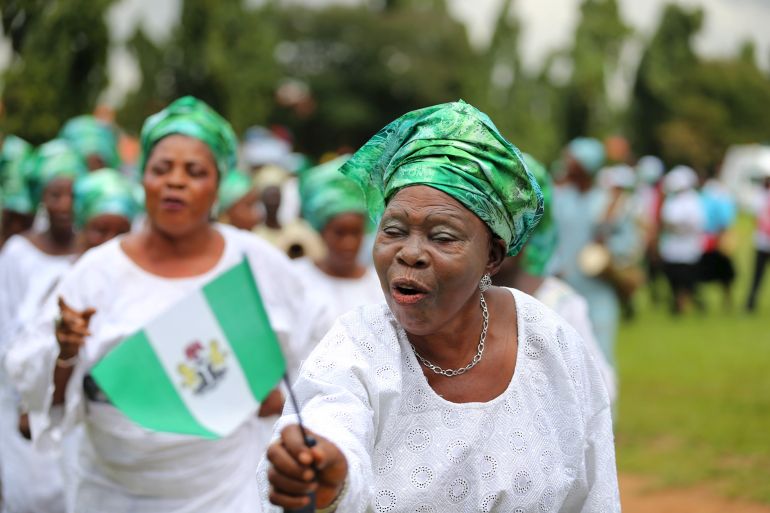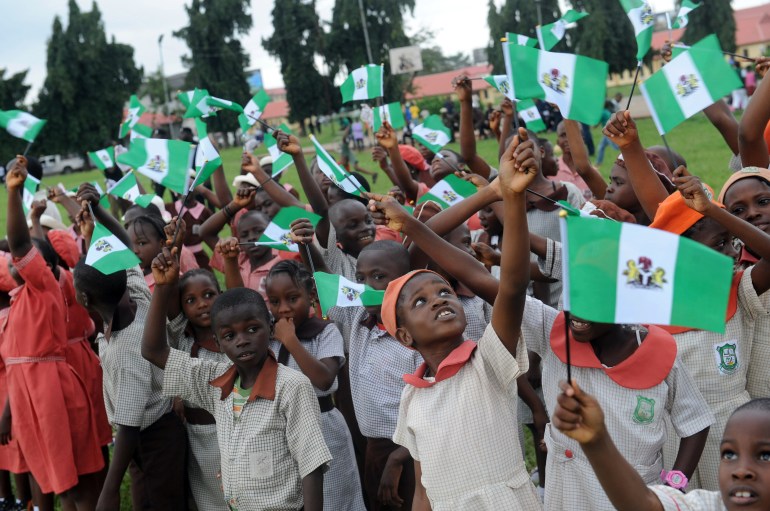Nigeria turns 60: Hope despite anger over corruption, poverty
With the African nation celebrating its independence day on October 1, citizens express concern over the issues it faces.

It was just after midnight in Lagos, on a horse-racing track turned square, when Nigeria’s new white and green flag was hoisted officially for the first time, replacing Britain’s Union Jack.
Several hours later, on the morning of October 1, 1960, a representative of Queen Elizabeth II handed Nigeria’s constitution over to Abubakar Tafawa Balewa, the country’s new prime minister.
“It was celebrations all over the place,” said Tanko Yakasi, 93, who attended a party that afternoon hosted by the soon-to-be-former governor-general, James Wilson Robertson.
“There were high expectations and the [Nigerian] political class really believed that they would be able to change the fortune of the country for the better.”
Nigeria became a republic three years later, with Nnamdi Azikiwe assuming the role of the president.
Large oil reserves discovered in 1956 had brought hopes of wealth and fortune to many.
“I remember my grandparents saying how life was easy back then,” 30-year-old Hamzat Lawal told AFP news agency. “They didn’t have to deal with today’s insecurity; they had jobs; they had a decent lifestyle.”
But the honeymoon did not last long. Six years after independence, Balewa was assassinated in a coup and shortly after, Nigeria plunged into a three-year civil war that killed more than a million people.
After the war ended, 30 years of coups and military dictatorships followed.
For Yakasi, who worked for Shehu Shagari, Nigeria’s first leader democratically elected in 1979, those decades of army rule had a crushing effect.
“There were personal differences among the military, and they engaged in coups and counter-coups. All this has taken a toll on the progress and development of the country, economically and otherwise.”
Civilian rule returned to Nigeria in 1999, ushering a renewed sense of hope that culminated with the first peaceful transition of power when Muhammadu Buhari, a former military head of state, became president in 2015.

Corruption, poverty and unrest
As the country became the world’s eighth biggest crude oil exporter, the political elite was accused of enriching itself massively from oil revenues.
Looking back since independence, history professor Olutayo Adesina, 46, paints a mixed picture with few successes and many failures.
Africa’s most populous nation has become a continental cultural powerhouse, boasting the world’s second most productive film industry and globally celebrated music scene.
But the vast country that spreads from the Atlantic Ocean to the semi-arid Sahel had in 2018 the highest rate of extreme poverty globally, according to the World Poverty Clock, created by the Vienna-based charity World Data Lab.
For Adesina and many others, politics and corruption are largely to blame.
“Ninety-nine percent of Nigerian politicians do not get into politics because they have something to offer to the people, but to butter their bread; for their own self-interest,” said the university lecturer.
The country’s attorney general has estimated that corrupt officials in cahoots with multinational firms have looted $400bn over the years.
“For me, it’s frustrating, and a lot of people my age and younger are frustrated,” said Lawal, who founded an anti-corruption organisation in Nigeria called Follow the Money.
President Buhari, 77, was first elected on promises to crack down on corruption but there have been few significant successes.
In Transparency International’s latest corruption perception index, Nigeria fell to 146 out of 180, its lowest ever ranking.
“The unfortunate situation in Nigeria today is that in politics people come to power in order to enrich themselves, not develop the country. This is our problem,” said Yakasi.
Ethnic clashes
The declining oil revenues led to Nigeria’s first recession for more than a quarter-century in 2016, with the COVID-19 pandemic now pushing the country towards another this year.
In the northeast, armed groups have killed more than 36,000 people in the past 10 years, forcing an estimated 2.4 million people to flee from their homes.
In central Nigeria and the northwest, clashes are rife between ethnically mixed but predominantly Christian farmers and Muslim Fulani herders, as well as vigilantes and criminal gangs.
“Ethnic feuds were sowed long before independence,” according to Adesina, “but when the British handed over power, they had established what is called a divide and rule system”.
The British organised the country into three geographic regions, controlled by Yorubas in the west, Igbos in the east, and Hausa-Fulanis in the north. This division of power created tensions that continue to this day.
Instead of celebrating Independence Day on October 1, a small group of Igbo separatists and Yoruba activists are organising protests this year.
The separatist “Indigenous People of Biafra” declared a sit-at-home “to protest alleged killings and bad governance” while the diaspora-led “Yoruba One Voice” said it will hold a “self-determination rally”.
This year’s celebrations will be held under the official slogan “Together at 60”. To mark the occasion, there will be a presidential broadcast and a guard of honour and parade in the capital, but events are expected to be low-key because of COVID-19.
As Nigeria’s oil-dependent economy faces its worst recession in 40 years, according to a World Bank report from June, young people like Lawal are anxious to have more of a say.
“We, young people, need to get a seat at the table,” he said. “But we need to break the table and build a new one that is more inclusive because currently it is not a table of justice and equity.”